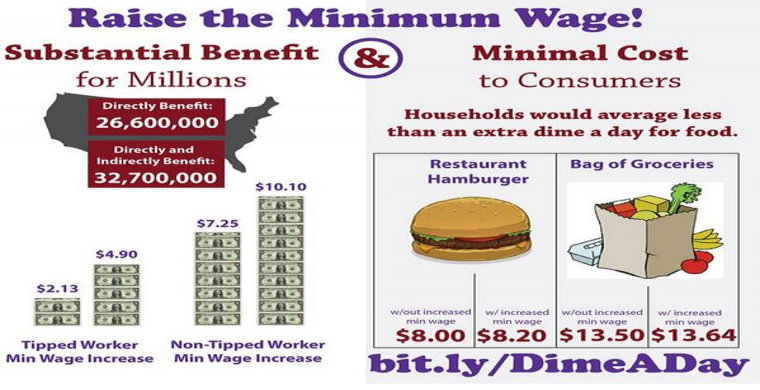Praise for Raising the Minimum Wage
By Mike McManus
January 8, 2014
The righteous care about justice for the poor, but the wicked have no such concern. Proverbs 29:7
Since 2009 the U.S. minimum wage has been $7.25 an hour. In the years it has been frozen the cost of living has risen 10%.
However, this week 21 states raised their minimum wages above the U.S. They deserve applause. As a result, nearly four million Americans enjoyed a wage hike, according to the Economic Policy Institute. In fact, 29 states with 60% of the population now have a higher minimum than the federal law.
President Obama has proposed that the minimum rise in steps to $10.10, which is less than it would be if the 1968 minimum had been indexed to inflation. However, a Republican dominated House never considered it. Now that Republicans also control the Senate, federal action seems hopeless.
Yet a Pew Poll reported 73% of the public approve a raise to $10.10. The support crossed party lines, with 91% of Democrats, 74% of independents and 53% of Republicans approving Obama's proposal.
Bipartisan support is not theoretical. Voters approved a minimum wage increase in four Republican-controlled states last November: Alaska, Arkansas, Nebraska and South Dakota.
The minimum rose in many states due to earlier legislation linking state minimums to the Consumer Price Index. As costs rise, so do state minimum wages. Perhaps that's how the federal law should work.
Economists are divided on the impact of raising the minimum wage. Steven Pearlstein says, "The intellectual case against the minimum wage can be boiled down the seemingly noncontroversial observation, backed by every introductory economics textbook, that whenever you raise the price of something, people will buy less of it."
If McDonald's has to raise the wages of its workers, fewer will be hired. Those who keep their jobs get the raise, but those who don't get hired, lose 100% of their income.
In the real world, however, Wal-Mart said it would not raise prices due to increases in the minimum wage, because it "can absorb these costs."
The question is, how many jobs are lost as the minimum rises? In 2014, more than 600 economists signed a letter in support of a $10.10 minimum wage. They argued that the rise could have a stimulative impact on the economy as low wage workers spend their additional earnings, raising demand and job growth.
Seven recipients of the Nobel Prize in Economic Sciences were among 75 economists endorsing an increase in the minimum wage for U.S. workers, arguing that "the weight" of economic research shows higher pay doesn't lead to fewer jobs.
According to a February, 2013 survey by the University of Chicago of 40 economists, 34% agreed with the statement that "Raising the federal minimum wage to $9 an hour would make it noticeably harder for low-skilled workers to find employment," but 56% were uncertain or disagreed.
Former President Bill Clinton put the issue much more simply last year: "I think we ought to raise the minimum wage because it doesn't just raise wages for the three or four million people who are directly affected by it. It bumps the wage structure everywhere. The estimates are that 35 million Americas would get a pay raise if the federal minimum was raised....If you raise the minimum wage in a phased way, it always creates jobs.
"Why? Because people who make the minimum wage or near it are struggling to get by. They spend every penny they make. They turn it over in the economy. They create jobs; they create opportunity and they take better care of their children. It's just the right thing to do, but it's also very good economics."
In his first sermon in Nazareth where he had been brought up, Jesus said, "The Spirit of the Lord is upon me, because he has anointed me to preach good news to the poor..."
The raise in the minimum wage in 21 states was indeed good news for the poor -- unless they did not get hired because of it.
Nevertheless, I suggest that the Republican Congress surprise the nation by proposing a modest hike from $7.25 to $8 immediately, with an agreement to raise the minimum in the future pegged to the cost of living.
It's not the $10.10 Obama requested, but a reasonable compromise.
Michael J. McManus, President of Marriage Savers and a syndicated columnist














